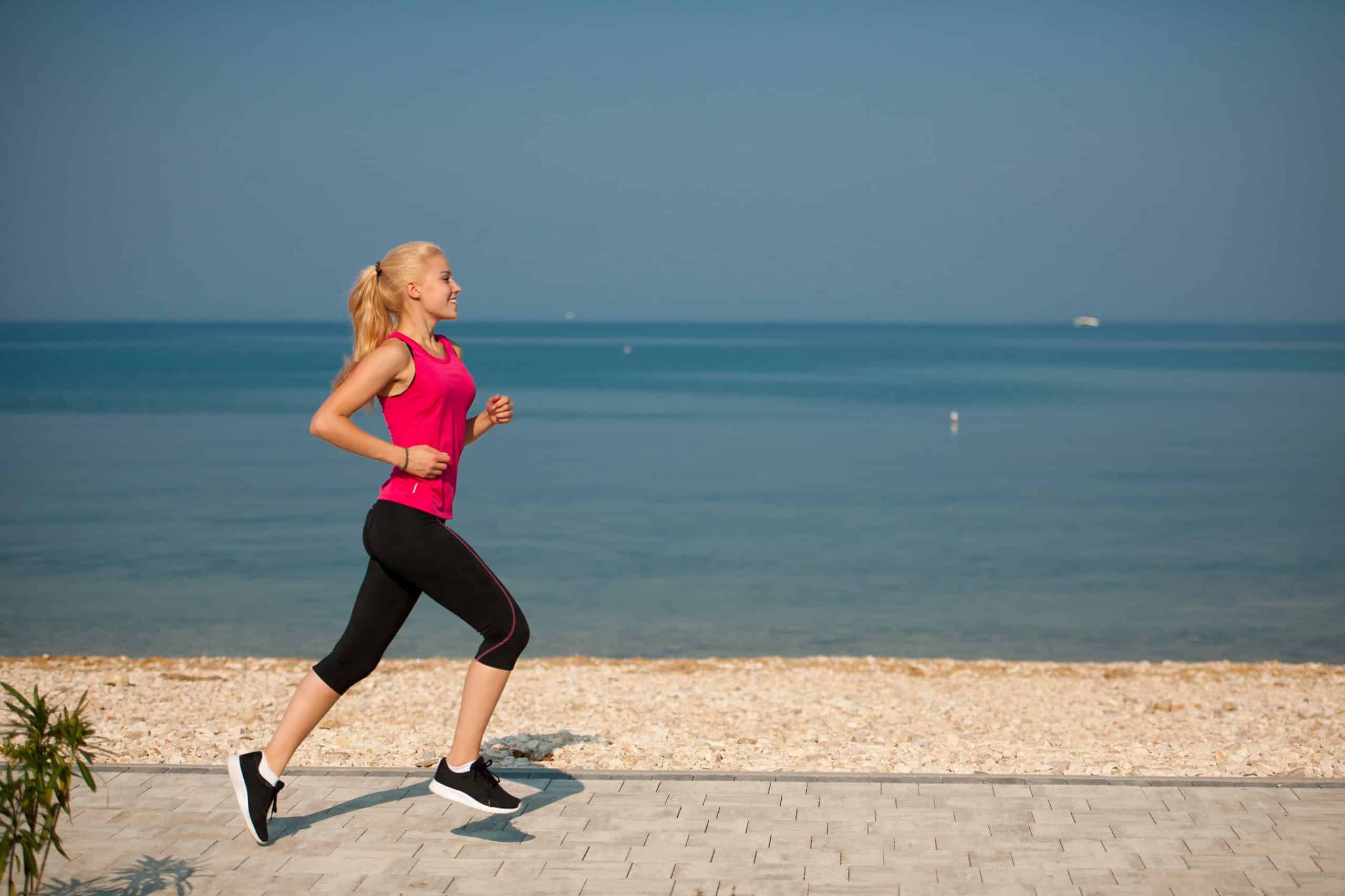Megan Omli: Welcome to the MetPro Method Podcast. I'm your host, Megan Omli. Today I'm joined by our usual host and lead coach, Crystal O'Keefe. Today we're going to mix things up a little bit and I'm going to be interviewing Crystal about her training journey after injury. Crystal, thank you so much for being here today.
Crystal OKeefe: I'm so honored this is so Fun! Thank you for doing this, Meg.
Megan Omli: Of course. I love this. We're changing things up and I'm excited to hear more about your training journey post-injury too.
Crystal OKeefe: Well, what would you like to know?
Megan Omli: Gosh. Okay, so let's just start from the beginning, which I already know a lot of this stuff, but, tell me or tell everyone, what have you been training for?
Crystal OKeefe: So, there is a marathon that is super, super famous in California, called the Big Sur Marathon. And it's a regular marathon course, but they have a ton of different distances that you can do. And one of the ones that they have is a 21-mile course. I had been training for that. I have a very slow run pace, and the cutoffs for the actual marathon are super strict. It's like you have to be done by like, I think it's 13:45 per minute. Which isn't that awful. But the course is incredibly hilly. I was not confident in my abilities because I've never done a marathon. So I was not confident.
Megan Omli: I know. I was going to say, this is two things. It's a marathon plus, anybody who knows Big Sur California knows like, wow, okay. That's a good, that's a reacher for the hills.
Crystal OKeefe: Exactly. So, I had opted to do the 21 mile course, and that one it starts at the same time as the marathon, but it starts obviously five miles down the road. You have 18 minutes and 45 seconds per mile.
Megan Omli: Okay, I see. I see what you did there. It's a lot more doable, right?
Crystal OKeefe: Yes. And they have a lot of runners and walkers, so I don't feel as pressured. And that was my thought process. I've done half marathons and I thought this would be a good bridge to get from.
Megan Omli: Yeah, absolutely. Yeah, absolutely. Very cool, and a gorgeous place to do so. My goodness.
Crystal OKeefe: Yeah. I mean, if you're going to travel to, do you know any of these events, I feel like you got to go big because I know that there are people that would probably disagree with me, but I've looked at a lot of events in Missouri and they're a little on the boring side.
So I like to make it a destination when I do these things.
Megan Omli: Absolutely. And so tell us, when did you start your training?
Crystal OKeefe: I actually started my training like back in November of 22. And so, for those listening may not be listening the second this came out, this is mid-April of 23.
So, it's been a while and um, I had already been running, but like I hadn't really been focused on building my endurance. So, at that point, my real focus was just get the miles in. I wasn't focused on a specific training plan.
Megan Omli: Yeah, absolutely. Okay, so now, we know what you were training for. Now tell us exactly what happened that caused the injury.
Crystal OKeefe: Yeah, so, I got in a fight with an SUV while crossing the street, and-
Megan Omli: That is one way to say it. Wow. Yes.
Crystal OKeefe: And I lost, uh, it turns out the human body is not a big fan of being hit by a car. In all seriousness, I was out training for run. I had like my fastest ever PR the day before and I was just out doing like a quick one and a half mile. Like for me it was a shakeout run, like 45 minutes out and back. And so, I was feeling really good.
I was running right by my house. I remember so vividly thinking, oh, I'm right at a mile. And um, I was in the crosswalk and this brand new driver, 16 year old girl, just got her license.
She was making a left on a yield and did not see me and crashed right into me. I will spare the graphic details, but I skidded across the pavement and, uh, I don't remember any of it. I just woke up in the middle of the street and I was like, “What just happened?” And uh, I really think, I believe very strongly that my phone being in my leggings that day, cause I was wearing a pair of leggings that had pockets and I had my phone in it.
And I think my phone saved my leg because so many people I've talked to, including a fellow coworker, uh, had kind of a similar thing happen to them and they did not have a phone in their pocket and they hit in the same place. And, uh, they had a lot of stitches. And other people I've talked to have had that happen too.
Megan Omli: Yeah. Wow. Crazy. Crazy. Okay, so you were hit by a car and obviously taken to the hospital, right? Like, I know we're sparing the gory details, but just to understand the severity of you weren't just like knocked to the ground. No. She wasn't just going four miles an hour.
Crystal OKeefe: No. Right. Yeah. She was going about 35 miles an hour according to onlookers. That was the estimate. Um, and apparently I like flew through the air and landed on the left side of my head, which you can still see a little bit left. And, uh, I broke my left collarbone. Um, and uh, there were pieces of my spinal column that were broken off, like the pieces that go outward.
There were three of those broken. And, um, and I didn't find this out till later, but I actually had a collapsed, partially collapsed lung. And, um, what else? Oh, and a major, like this was a major concussion, and road rash from the top of my shoulder blade all the way down to the top of my thigh on my left side.
I slid across. It was definitely not nothing. And it was very scary. Uh, I remember being in the ambulance. I remember sitting on the ground and the cop came up to talk to me and he was like, are you okay? And I was like, yeah, but I'm really tired. I'm just going to lay down. Because I was
sitting up and he was like, no, no, no, no, no, no, no,
Megan Omli: You're not going to actually go to sleep. No, no, no, we're not doing that.
Crystal OKeefe: And like, something in the back of my brain was like, oh, this is like a bad thing. Like if you have a head injury, you're not supposed to go to sleep. And so, I was like, okay, I can do this. Like I can stay awake and it wasn't long after that they had me in the ambulance and on the way to the and I heard the ambulance driver calling in all of my injuries.
And that's when it started to sink in. Like how bad this was. And I was like, “Am I going to be okay?” And, and she was like, “We're going to do our best.” And you know, I know she was just trying to be comforting, but like at that moment I just, I lost it, you know? I was just really scared.
And, um, yeah, that, I have to say, I am not a person who does things in a way to get injured. Like I've never actually been injured in my life. I've never had a broken bone. I've never had to be rushed to the hospital for anything. Like it was a very new experience, uh, one that I do not recommend. Zero out of five stars do not do.
Megan Omli: Yes, absolutely. Absolutely. Okay, so where in your training period did this happen?
Crystal OKeefe: So this occurred about 13 weeks out from the event. Uh, and so, you know, I didn't know at that time like, am I really going to be able to do this? Uh, am I still going to be able to do Big Sur?
And in fact, I asked the original doctor that came in, the ER doctor, and then like every person that came in after that, I asked and they kept saying yes. I was so surprised, and they were like, why do you care about this right now? It's going to be okay. Once, I knew that my brain was not bleeding and I did not have a spinal cord injury, which are the two things I was worried about.
Then I was like, okay, so Big Sur. And they were like, yep, you can do it. And I was like, be back. Wow. Like, really? Because at the time I couldn't move, like sitting up was impossible. Uh, getting out of bed was impossible. It seemed impossible to think like, oh, I'll be able to run in a weeks time.
Like that did not seem like a thing at all.
Megan Omli: Absolutely. Absolutely. So then asking, you know about that, how did you go about getting back to your training?
Crystal OKeefe: Yeah, so, um, pretty much the first week was kind of a blur. Uh, the concussion symptoms were pretty bad that first week. And then sometime during the second week I was able to get up and down without assistance.
Like my, my husband felt comfortable leaving me to go to work and I was like, okay. Right, right. I can start moving again. And uh, you know, I was like, I can be a little hardheaded, so I was like, oh, I'll just like try to walk on the treadmill. And Tom was like, my husband was like, um, yeah, why don't we talk to the doctor before you start doing that and, uh, so Sorry, Tom.
First we went for a visit to my general practitioner, uh, as a follow up to my concussion. And, you know, they, they basically said, let your body be the guide. And yeah, so, um, I just really just started with just slowly walking on the treadmill and, um, I did let my body be the guide. And during the concussion, again, I'd never had an injury like this before.
I wasn't exhausted when I walked, but later I was incredibly exhausted during the day. And then, yeah, the other interesting thing about it was I couldn't sleep well if I overdid it. So if I like tried to exercise or tried to do anything. Yeah, it was almost like when you're a kid or like you, you have little ones, you know, like they get over stimulated.
Oh yeah, that's what my brain was doing. Yeah. Yeah, it was like, um, it was really weird. It was a very weird sensation that, uh, I didn't recognize. So, um, and then, you know, I was unsteady on the treadmill and so, you know, I wore the little clip and I did the whole thing to be safe. And, um, and I always made sure somebody was at home.
I mean, if. First it was like absolutely even taking a shower, I was like, uh, everyone, I am taking a shower. Like if you hear any loud noises, come get me.
Megan Omli: And so when you first started walking on the treadmill, how many weeks post-injury was that?
Crystal OKeefe: That was two weeks. Two weeks. Okay. Um, and it was, it was a very slow, impressively, slow. It was a very slow walk. Like, just to be clear, that's okay.
Megan Omli: Uh, right. You, you start somewhere that's. That's the big thing, right? Yeah. We're returning from injury. You have to start somewhere and not starting too fast, right?
Crystal OKeefe: Absolutely. And, and to be perfectly frank, um, I am terrified of cars now. And so yeah, going outside, uh, that was too much for me.
I did not, I was not ready to go outside. Yeah. So the treadmill felt safe, you know, that felt like a safe place and I, I really was kind of feeling a little crazy, not moving like it was, it was just sitting down all the time, and especially that first week. Honestly, the most painful thing that I experienced was the road rash.
Um, yeah, it was just, it was just the most painful thing I have ever experienced. And so when I got past the point where like that had stopped hurting so badly, I really just wanted to move. And the pieces on my lower back that had broken off, they created this inflammation in my lower back. So, picking up my feet was almost impossible that first week.
And then as that started to get better, and, and that was really my, like, okay, I can start walking on the treadmill when I could pick up my feet. And it still was pretty heavy, you know, but, um, yeah, but a nice slow, very slow walk. And, and it was slow that, that first time I did it. And then I didn't do it again for like, three days after that.
Megan Omli: That was going to be my next question. That was pretty fatiguing. And it was like, okay. Take a minute.
Crystal OKeefe: Definitely. And, and I mean, that was only a 20 minute walk and it was so slow and I was like, oh, I'm being too easy on myself. And then like I was that night, I was like, I was not too easy on myself and it was super exhausting.
Megan Omli: Yeah, being realistic, that was really important, especially after injury. Wonderful. Okay, so let's progress that a little bit, right? I do want to ask, you know, MetPro, right? What were you doing food wise during this time? How are you starting to, obviously refeed refuel. I know. Acutely like right post injury, it was probably a completely different story, but what did it look like, to start to eat better, to fuel yourself as well?
Crystal OKeefe: Yeah, great question. The immediate response right after was like, I just kind of did whatever I wanted. Yeah. And then, as I started to get back into, okay, we need to like actually focus on the nutrient side of things. Um, yeah. There had been people that had sent me things like soup and, and stuff like that, and I, I focused on like trying to round out like, so if I had chicken noodle soup for example, I would add additional chicken to it just to make sure I had the protein.
Um, I made sure to stay up on my vitamins. Even at the hospital they were super, like, this is, they were very focused on make sure to take these vitamins every day. Yeah, they seemed wonder. That's great. Yeah, that's great. And um, and so I made sure to get a good variety of vegetables. Even if at first my focus was not on, like, eating perfectly or even eating on like the MetPro Plan, my focus was just on.
Having foods that were nourishing, even if they weren't the perfect amounts. And so, yeah, absolutely. Yeah. That, that was my big thing. And um, obviously my level of activity had dropped so, so much that like I wasn't as hungry. And so, you know, A lot of times it would be like a big veggie meal with some, with like protein and that's kind of what I stuck with for a little bit.
Yeah. Um, but then as I started to be able to do more, even just get around the house easier, you know, uh, I remember so vividly the day that, uh, Tom felt comfortable letting me walk down the stairs without the lights being on first thing in the morning. He was like, okay. You know, he would like, okay, you can leave the lights off, honey.
Exactly. You know, and I could walk down the stairs without, like, grabbing onto the, the railing and like really going down slowly. And as I started to be able to get around the house a lot easier, um, that was when it was like, okay, now I can have like a turkey sandwich for lunch and I could have, yes, um, for dinner.
I could still have simple meals, but they were, they were like a little bit bigger and I could start to focus on more like, here's, here's the types of food that I should be eating. But, um, I still could keep my portion sizes down a lot lower just because my activity was so much lower.
Megan Omli: Mm-hmm. Okay. Okay. And so when did you know it was time to, you know, really kick back into your routine where you felt like, okay, I'm ready.
I feel good, you know, how many weeks and how did you kind of navigate? How did you kind of navigate that?
Crystal OKeefe: Great question. Um, so it was about two and a half weeks, uh, into the injury. I went to a physical therapist, um, okay. And I was gonna ask about that. Yeah. I was really nervous about my shoulder because, um, I could, I could only lift my arm to like here, and I was like, oh dear.
Okay. Like, I, I mean, and, and so for those of you not looking like I couldn't lift it, Even with my shoulder. Yeah. Um, that was as far as I could go and I was very concerned about that. And with, before the hour, the first hour was up, they had my shoulder completely back to mobile. It was crazy. Wow. Yeah.
Megan Omli: That's amazing. Um, that's great. They said it was adjusting to move things a little differently.
Crystal OKeefe: Exactly. They said it was kind of just like lack of use and is kinda like a rusty hinge. And so they got it going and um, we immediately started working on leg stabilizers and. They had this amazing thing that I had never even heard of, uh, where you like, uh, you know how you put a blood pressure cuff on and it starts?
Yes. Okay. Well, they did that to my legs. Um, because they have, yeah, so they, they've done studies that say that like, if they reduce the blood flow, That, um, it actually increases the human growth hormone, which helps so much with healing. And so since it was so early on into the process, they felt that that was important.
Uh, we only did that a couple of times and, uh, that was, um, that was just so easy to do, like such a simple thing. Yeah. Um, and then, so every week I would go twice a week and they had me just doing all kinds of things, stability and stuff. And then, um, they basically said, well, you'll know when you're ready to run.
Yeah. And uh, it was about, I think four weeks in where I had been out walking. I had felt brave enough to go outside. I wasn't on the main street. Wow.
Megan Omli: Look at you. That's that's big, right?
Crystal OKeefe: That's big. It was, it was. And, and I have to be very transparent. I did not go on the main street where I got hit, but like in my neighborhood, um, and I still have not gone out to that big street.
I don't know that I ever will. Uh, but, uh, the, the neighborhood felt safe. And so I walked around the neighborhood and I felt like jogging. I, I told Okay, there, it's four weeks later. Wow. Four weeks later. And I started jogging and it was a very slow jog. And, uh, then it just kind of progressed from there.
And every week I could do a little bit more and a little bit more. Uh, and then it was actually just three weeks ago today, um, the, the physical therapist was like, Go to town, do anything you want. Um, just no restrictions. He was like, no restrictions, and just, we'll see where you're at in two weeks. And I went for my checkup yesterday and, uh, we're still working on alignment with my right knee and making sure everything's good, but it's more like maintenance prep for Big Sur than it is like absolutely we have to fix things at this point.
So, But yeah, I, I'm back to running. Um, I was, I'm able to do sprints again. I'm able to do hills. I have no, no issues. My shoulder's totally fine. Um, it's, it's, uh, it's amazing. It really is Amazing. Yeah.
Megan Omli: That's awesome. That's awesome. So, tell us about your training now, um, and kind of how you're feeling about the 21 miles and, you know, maybe just a little bit.
Did your, did you have to do a mental resetting, right, of, Hey, what am I going to look to accomplish for these 21 miles after all of this?
Crystal OKeefe: Yeah. Yeah. I, I'm going to start there. Yes. I absolutely had to reset because my original goal was to run a lot of it. And, uh, kind of do that walk run method, the, the Galloway method.
That was my, my thought process. And I have a couple of people from my Peloton world that are going to be out there, and we were going to be running it together. Oh. And, uh, and they're all, they're still going by the way, but, um, but yeah, after this happened, um, It. My goal, my goal had to shift because this is no longer gonna be like the longest distance I've ever run, uh, right.
Without, because I don't know what I can accomplish. I haven't had time to do those long training runs on the weekend where it's like, I'm able to do four hours straight. I, I haven't gotten back to that. I mean, I'm, I'm definitely running. I feel really good, but I haven't even had time to build up to that.
Um, I have no idea what's gonna happen. Absolutely. Yeah. Um, I do know that a couple years ago I walked an entire marathon on my treadmill. So I feel confident that I can do it, but of course there are those big hills in Big Sur. So I've had to reset my expectations to be, go with the flow, um, and, and be appreciative that you are alive.
Be in the moment. Yeah. Um, and be with your friends and enjoy the scenery and so, yeah. That, that has become, instead of this being like this big moment, for me, it's just a celebration that I'm freaking here.
Megan Omli: Absolutely yes. That, that is a, a mental shift for sure. But a, a thankful one too, right?
Absolutely. You get to get out there and you still get to walk in and like you said, enjoy the beautiful scenery and see some friends. And do all of that, so that's wonderful.
Crystal OKeefe:: Yeah. And as far as my, my training goes, I've been doing, um, I've been doing running like three to four times a week. Yeah. Um, and I kind, I've been alternating with strength days and then on my weekends I have been doing a long run, but it's like the longest I've gotten to has been, 75 minutes, which is no slouch.
Megan Omli: It's not a slouch or anything, but no, it's. Yeah. But obviously a long way from 21 Miles site where you would hoped to be at this point, correct? Correct. Yes. Okay. Okay. And that, that is okay, right? As we just said, you know, being able to get out there is really important. Okay, so that's training. How about fueling right now, what are you, what are you doing in, in that respect?
How are you, how are you preparing for that?
Crystal OKeefe: Uh, so right now I am focused on just keeping, my intake's steady. I have really struggled with the sugar, the kind of like addiction that, that I always deal with. And like during that time I had a lot of treats when I first got outta the hospital, first got home and, uh, people were so nice and sent me Spending you chocolates.
Yes. And all the. Things I know. And even Angelo was like, if ever you deserved ice cream, it's now, it's now. So, so yeah, I absolutely did that and, and I did deserve it, but, um, but I'm having trouble letting it go just to be completely transparent. And so right now my goal is just to be like consistent on my fuel and then those longer runs that I've been doing, I haven't gotten long enough that I need to add a ton in.
So, an extra little bit of carbohydrates goes a long way when you're just right at that threshold of an hour to an hour and 15 minutes. Absolutely. And, and so I haven't really had to change much. Um, as far as the MetPro Plan goes. I've been able to keep that and luckily I've had. So much experience that I'm, I'm very confident like the day of having a few gels, having some, uh, extra hydration.
And I know that I'll be fine and it's not a very hot course out there, luckily.
Megan Omli: So you're gonna have the opposite problem probably. I will. I will. Yeah. Right here it was. 36 degrees this morning, so, oh, hopefully a couple more weeks. It'll be warmer for you.
Crystal OKeefe: I will say I'd much rather run in 36 than 80 like I have any day, any day.
Megan Omli: Love it, love it, love it. That's great. Oh, I loved hearing, I loved hearing this story. Is there anything else? Any other pieces of your journey that you think would be helpful for all of us to know?
Crystal OKeefe: And just to, to share with you, I think I just would like to share, I did not realize the importance of having a physical therapist.
I think a lot of people are so used to doing things on their own, suffering through things on their own. Um, and the things that they have been able to do with one session, like this past week, my knee was kind of freezing up after I had done a bunch of step ups and. Um, really it was just my hip wasn't open all the way.
And I know logically a lot of us know these things, but, but I don't think people realize how quickly those things can be addressed. I mean, by the time I left, I felt really good. My knee wasn't bothering me, and that was, that was 40 minutes, of just changing things. So, um, You know, look, there is a time and a place for doing things on your own and persevering and pushing through.
There is also a time and a place for getting help and not being afraid to ask for help, and not being afraid to look to experts because that is what they are there for. Absolutely. So, absolutely.
Megan Omli: I said something like that earlier today to a client and I'm like, I don't want you to figure that out.
That's my job. Let me do it. Exactly. Absolutely. That's awesome. Good. Well, you and I are gonna chat after the event, which is in you. A, a little bit of time here, but I will look forward to hearing all about how it goes.
Crystal OKeefe: Well, I'm excited. I hope it all goes well, and hopefully I'll have something good to tell you.
Megan Omli: It will, it's gonna be amazing, and yes, you will. You'll have a great report regardless of how it all goes. So, That's good. Well, thank you Crystal, so much for your time today, listeners, that's all this week. You can find all of the MetPro Method episodes anywhere you get your podcast or at metpro.co/podcast.
Please be sure to follow the show and rate and review that lets other people know what they can expect from the show. I'm your fill in host, Megan Omli, and I'll be back next time. Until then, remember, consistency is key.





